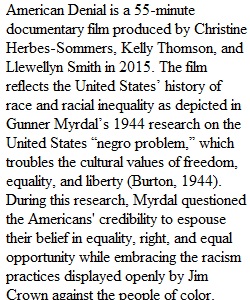


Q Introduction This film examines the history of race and racial inequality in the US. The film follows Gunner Myrdal’s 1944 research on the US “negro problem” which troubles the cultural values of equality, liberty, and freedom. This documentary brings the concept of implicit bias to a contemporary setting to understand the ongoing racial inequalities despite the Civil Rights Movement. Directions In this assignment you will watch the documentary film American DenialLinks to an external site. and then write a reflection paper that first summarizes the main points from the film and then addresses the following questions: • Have race issues improved since Myrdal’s study? • Do you think that having a black president has moved us closer to racial equality in the United States? Why or why not? • What do you think about the concept of implicit bias and how is a bias reproducing inequality? • What is the most important thing an individual can do to reduce prejudice and discrimination? Due Date Sunday 11:59 pm CT Rubric Unit 6: American Denial Reflection Paper Unit 6: American Denial Reflection Paper Criteria Ratings Pts This criterion is linked to a Learning OutcomeSummary 15 pts Exceeds Expectations Student provided a detailed summary of the content. The summary was focused on the details relevant to the assignment. 10 pts Meets Expectations Student provided a short summary of the content. The summary was vague and missed some of the details relevant to the assignment. 0 pts Does Not Meet Expectations The student did not summarize the content. 15 pts This criterion is linked to a Learning OutcomeReflection 30 pts Exceeds Expectations Reflection addressed all questions within the assignment prompt. The student made clear and accurate connections from the content to course concepts and themes. 20 pts Meets Expectations Reflection addressed most of the questions within the assignment prompt. The student made some connections from the content to course concepts and themes. 0 pts Does Not Meet Expectations Reflection did not address the questions within the assignment prompt. The student did not make connections from the content to course concepts and themes. 30 pts This criterion is linked to a Learning OutcomeReadability and Timely Submission 5 pts Exceeds Expectations Reflection was clearly written and the language is easy to follow. Reflection was submitted by the deadline. 3 pts Meets Expectations Reflection was difficult to follow and understand the student’s perspective. Reflection was submitted by the deadline. 0 pts Does Not Meet Expectations Reflection was not clearly written and the language is not easy to follow. Reflection was not submitted by the deadline. 5 pts Total Points: 50 PreviousNext
View Related Questions